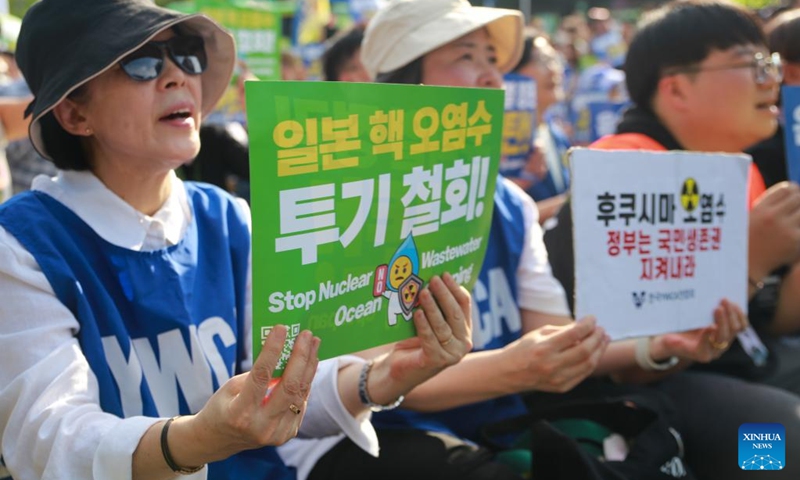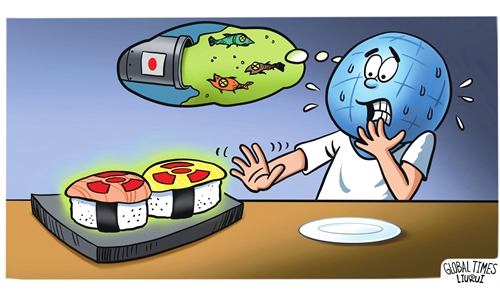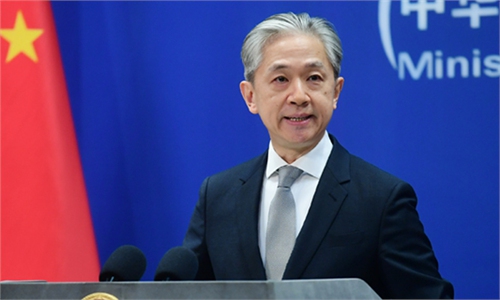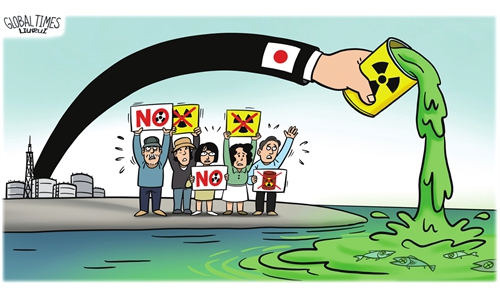Japan begins 3rd round of contaminated water dumping amid international opposition
Chinese, S.Korean, US legal experts push for new intl convention to regulate waste disposal

People attend a rally to protest against Japan's dumping of nuclear-contaminated wastewater into the ocean, in Seoul, South Korea, Sept. 2, 2023. (Photo by Yang Chang/Xinhua)
Japan started its third round of dumping of nuclear-contaminated water into the sea on Thursday, only a few days after a scandal that saw five workers get doused with radioactive water at the Fukushima Daiichi Nuclear Power Plant, which once again triggered a backlash at home and abroad concerning the chaotic management and unconvincing safety of disposal of the contaminated water.
At a regular press briefing on Thursday, Chinese Foreign Ministry spokesperson Wang Wenbin told the Global Times that Japan has disregarded domestic and international opposition and has already dumped 15,600 tons of nuclear-contaminated water into the ocean, irresponsibly shifting the risk of pollution onto the entire world.
The incident on October 25, in which radioactive wastewater splashed onto five workers at the plant, once again exposes the chaotic internal management at TEPCO, the operator of the plant, the Chinese spokesperson stated. The so-called safe and transparent dumping claimed by Japan is fundamentally unconvincing and involves concealment and deception, he said.
Wang made the remarks on Thursday after the third round of dumping of nuclear-contaminated water began with plans to pump about 460 tons per day through November 20, Japanese media outlet Kyodo News reported.
While the Japanese government and TEPCO claim that the tritium level in the radioactive water during the previous release was "far below" the World Health Organization's limit for drinking water, distrust is mounting among the Japanese public.
For example, on Twitter, many Japanese netizens said TEPCO had "zero credibility," while others expressed their nervousness concerning the so-called "treated water."
Even though the discharge of the contaminated water is attracting attention from all over the world, the TEPCO and Japanese government have handled it very poorly, said a Japanese netizen, who also fears the accumulation of these scandals could lead to another major accident.
The Global Times learned from a Japanese citizen group that on October 24 they had once again protested against the dumping in front of the Japanese prime minister's official residence. They vowed they would never give up until the Japanese government halts the discharge.
However, public demands and concern from the masses have been ignored by Japanese politicians and mainstream media.
The Mainichi Shimbun boasted on Sunday that more Japanese citizens, including those from fishery associations, have accepted the contaminated water disposal.
Yoshitaka Ikarashi, a Fukushima resident who has long been committed to opposing the dumping, told the Global Times on Thursday that many stakeholders are being kept quiet because they have received funds and compensations for easing the so-called reputation damage from the release.
Separately in South Korea, Chinese, South Korean and US legal experts gathered together at a closed session to discuss the response to the contaminated water issue, the Global Times learned on Thursday from Chang Yen-chiang, director of the Yellow Sea and Bohai Sea Research Institute of Dalian Maritime University.
At the meeting, the experts agreed to push for a new international convention, which should be more specific and detailed than the existing United Nations Convention on the Law of the Sea, Chang, who attended the meeting, revealed. The convention should include punishments and standard operating procedures to deal with nuclear contamination, the Chinese expert said, noting that, if ratified one day, the new convention could quite possibly fill in the gaps in current international law and regulations.
Given the constant concern around the world, Wang Wenbin on Thursday pointed out that as more and more contaminated water is discharged into the ocean, the urgency of establishing a long-term and effective international monitoring arrangement involving Japan's neighboring countries and other relevant stakeholders is becoming increasingly evident. The International Atomic Energy Agency should play its due role in this regard. The Japanese side should fully cooperate and take strict measures to prevent irreversible consequences caused by the discharge.
A spokesperson for the Chinese Embassy in Japan also made a similar statement on Thursday, stressing that China's position on the discharge is clear and firm.



